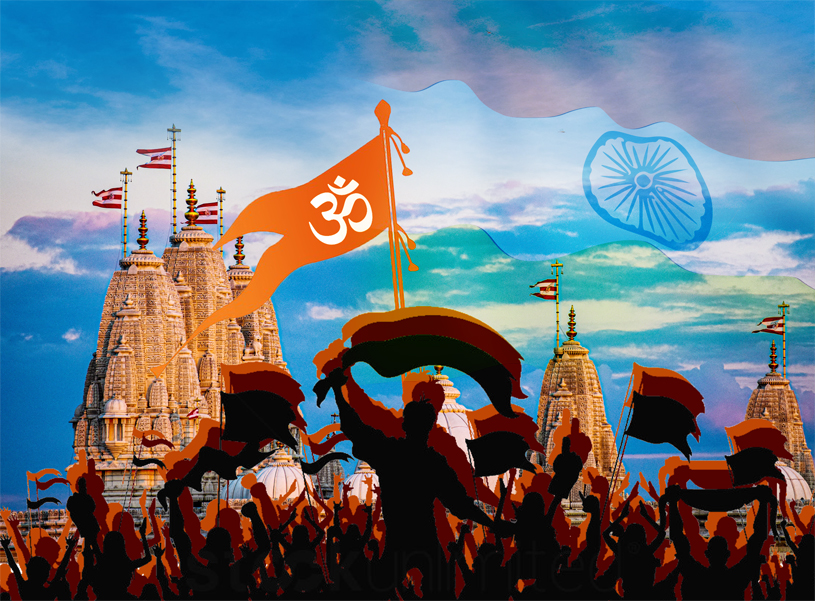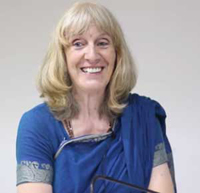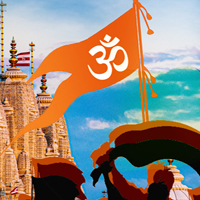Why Not Hindu India?
What if an Indian had written this… Would anyone believe it? By Maria Wirth

Though I have lived in India for a long time, there are still issues here that I find hard to understand. For example, why do so many educated Indians become agitated when India is referred to as a Hindu country? The majority of Indians are Hindus. India is special because of its ancient Hindu tradition. Westerners are drawn to India because of Hinduism. Why then is there this resistance by many Indians to acknowledge the Hindu roots of their country? Why do some people even give the impression that an India which valued those roots would be dangerous? Don’t they know better?
This attitude is strange for two reasons. First, those educated Indians have a problem only with “Hindu” India, but not with “Muslim” or “Christian” countries. Germany, for example, is a secular country, and only 49 percent of the population are registered with the two big Christian churches (Protestant and Catholic). Nevertheless, the country is bracketed under “Christian countries” and no one objects. Angela Merkel, the former Chancellor, had stressed the ‘Christian roots of Germany’ and had urged the population “to go back to Christian values.” In 2012 she even postponed her trip to the G-8 summit to make a public address at the Katholikentag, “Catholics Day.” Two major German political parties carry “Christian” in their name, including Angela Merkel’s Christian Democratic Union.
 Germans are not incensed that Germany is called a Christian country, though I actually would understand if they were. After all, the history of the Church is appalling. The so-called success story of Christianity depended greatly on tyranny. “Convert or die” were the options given—not only some five hundred years ago to the indigenous population in America, but also in Germany, 1,200 years ago, when Emperor Karl the Great ordered the death sentence for refusal of baptism in his newly conquered realms. This provoked his advisor Alkuin to comment: “One can force them to baptism, but how to force them to believe?”
Germans are not incensed that Germany is called a Christian country, though I actually would understand if they were. After all, the history of the Church is appalling. The so-called success story of Christianity depended greatly on tyranny. “Convert or die” were the options given—not only some five hundred years ago to the indigenous population in America, but also in Germany, 1,200 years ago, when Emperor Karl the Great ordered the death sentence for refusal of baptism in his newly conquered realms. This provoked his advisor Alkuin to comment: “One can force them to baptism, but how to force them to believe?”
Those times, when one’s life was in danger for dissenting with the dogmas of Christianity, are thankfully over. Today many in the West dissent and are leaving the Church in a steady stream. They are disgusted with the unholy behavior of Church officials and they also can’t believe in the dogmas, for example that “Jesus is the only way” and that God sends all those, who don’t accept this claim, to hell.
The second reason why I can’t understand the resistance to associate India with Hinduism is that Hinduism is in a different category from the Abrahamic religions. Its history, compared to Christianity and Islam, was undoubtedly the least violent as it spread in ancient times by convincing arguments and not by force. It is not a belief-system that demands blind acceptance of dogmas and the suspension of one’s intelligence. On the contrary, “Hinduism encourages using one’s intelligence to the hilt. It is an inquiry into truth, based on a refined character and intellect. It comprises a huge body of ancient literature, not only regarding dharma and philosophy, but also regarding mathematics, architecture, music, dance, science, astronomy, economics, politics, etc.”
If Germany or any other Western country had this kind of literary treasure, they would be so proud and highlight its greatness on every occasion. When I discovered the Upanishads, for example, I was stunned. Here was expressed in clear terms what I intuitively had felt to be true, but could not have expressed clearly: Brahman is not partial; it is the invisible, indivisible Essence in everything. Everyone gets again and again a chance to discover the ultimate Truth and is free to choose his way back to it. Helpful hints are given but not imposed.
In my early days in India, I thought every Indian knew and valued his tradition. Slowly I realized I was wrong. The British colonial masters had been successful in not only weaning away many of the elite from their ancient tradition but even making them despise it. It helped that the British-educated class could no longer read the original Sanskrit texts and believed what the British told them. This lack of knowledge and the brainwashing by British education may be the reason why many so-called “ “modern” Indians are against anything Hindu. They don’t realize the difference between Western religions that have to be believed blindly, and which discourage, if not forbid, their adherents to think on their own, and the multi-layered Hindu Dharma which gives freedom and encourages using one’s intelligence. “
Many of India’s educated class do not realize that those who dream of imposing Christianity or Islam on this vast country will applaud them for denigrating Hindu Dharma, because this creates a vacuum where Western ideas can easier gain a foothold.
 At the same time, many Westerners, including staunch Christians, know the value of Hindu culture and surreptitiously appropriate insights from the vast Indian knowledge system, drop the original Hindu source and present it either as their own or make it look as if these insights had already been known in the West.
At the same time, many Westerners, including staunch Christians, know the value of Hindu culture and surreptitiously appropriate insights from the vast Indian knowledge system, drop the original Hindu source and present it either as their own or make it look as if these insights had already been known in the West.
As the West appropriates valuable and exclusive Hindu assets, what it leaves behind is deemed inferior. Unwittingly, these ‘modern’ Indians are helping what Rajiv Malhotra of Infinity Foundation calls the digestion of Dharma civilization into Western universalism. That which is being digested, a deer for example (analogue to Hindu Dharma), disappears whereas the tiger (analogue to Western Universalism) becomes
If only missionaries denigrated Hindu Dharma, it would not be so bad, as they clearly have an agenda which discerning Indians would detect. But sadly, Indians with Hindu names assist them because they wrongly believe Hinduism is inferior to Western religions. They belittle everything Hindu instead of getting in-depth knowledge. As a rule, they know little about their tradition except what the British have deceptively taught them, i.e., that the major features are the caste system and idol worship. They don’t realize that India would gain, not lose, if it solidly backed its profound and all-inclusive Hindu tradition.
The Dalai Lama said some time ago that, as a youth in Lhasa, he had been deeply impressed by the richness of Indian thought. “India has great potential to help the world,” he added.
Will the Westernized Indian elite realize it?
About the Author
 Maria Wirth is a German who stopped in India (that’s at least what she thought) on her way to Australia after finishing her psychology studies at Hamburg University. She visited the Ardha Kumbha Mela in Haridwar in April 1980 where she met Sri Anandamayi Ma and Devaraha Baba, two renowned saints. With their blessing she continued to live in India and never went to Australia. She dove into India’s spiritual tradition, sharing her insights with German readers through articles and books. For long, she was convinced that every Indian knows and treasures his great heritage. However, in recent years she noticed that there
Maria Wirth is a German who stopped in India (that’s at least what she thought) on her way to Australia after finishing her psychology studies at Hamburg University. She visited the Ardha Kumbha Mela in Haridwar in April 1980 where she met Sri Anandamayi Ma and Devaraha Baba, two renowned saints. With their blessing she continued to live in India and never went to Australia. She dove into India’s spiritual tradition, sharing her insights with German readers through articles and books. For long, she was convinced that every Indian knows and treasures his great heritage. However, in recent years she noticed that there


















